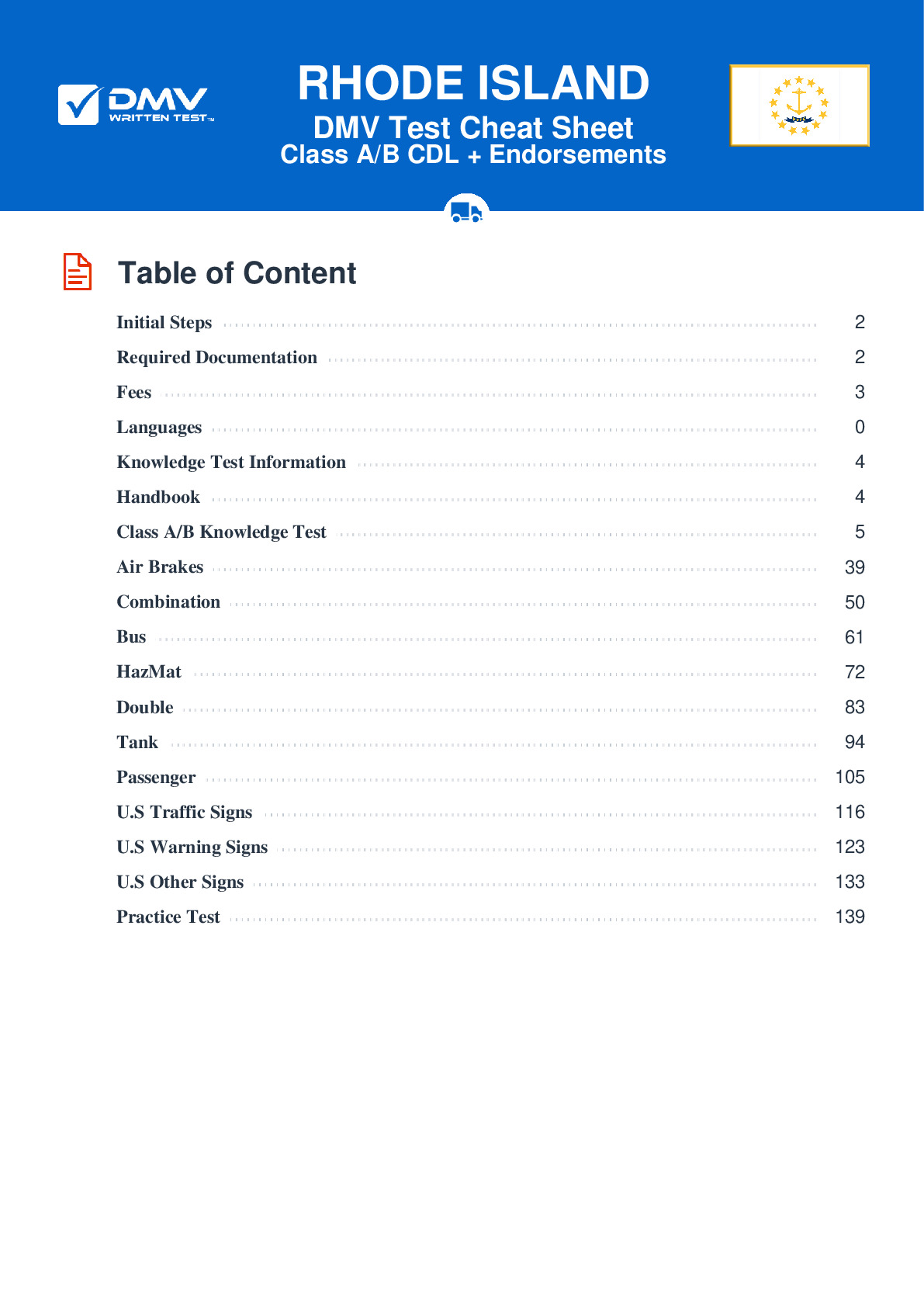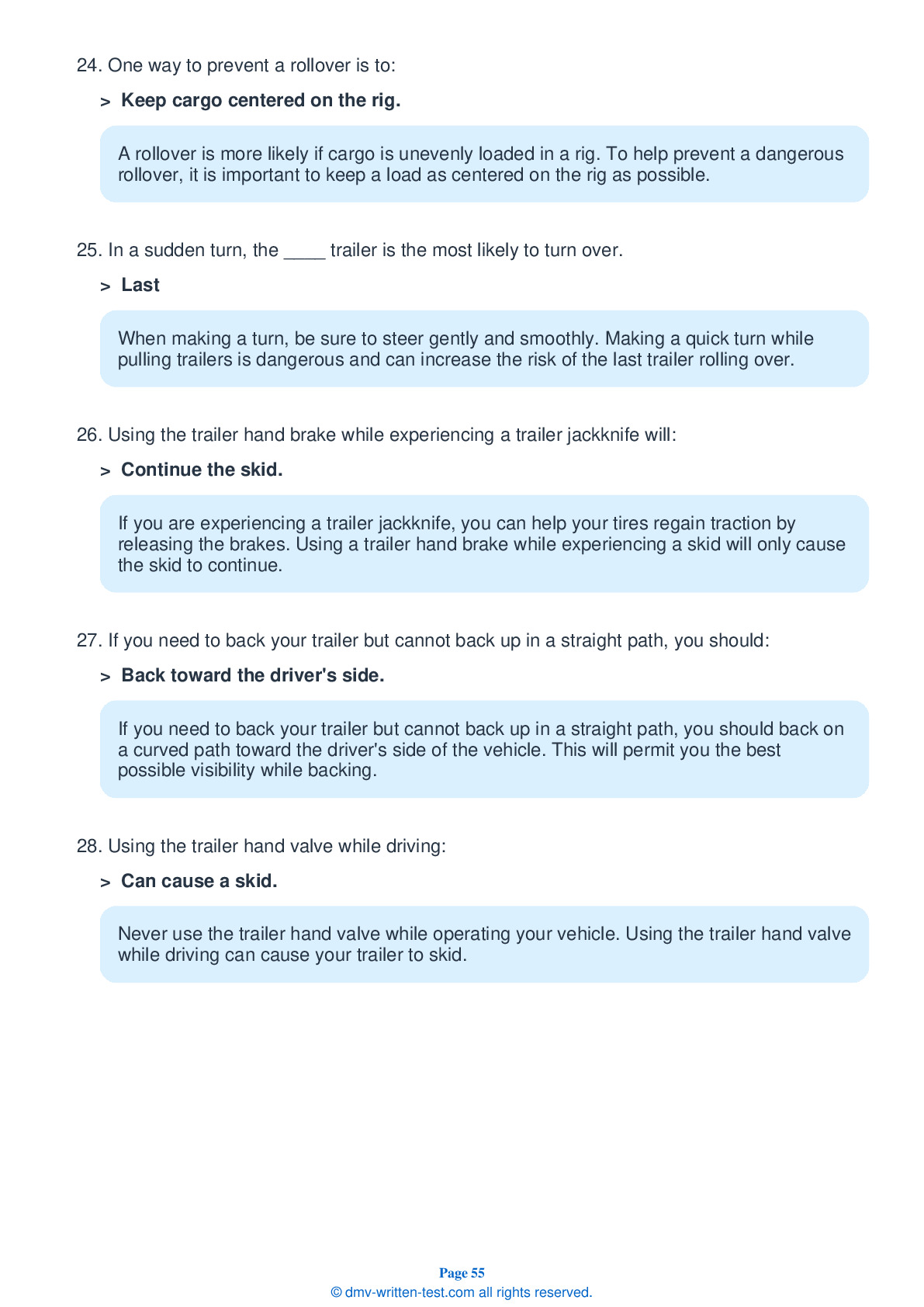Knowledge Test Class B
This license is required for driving a single vehicle with a GVWR of more than 26,001 pounds, and a trailer not to exceed 10,000 pounds gross vehicle weight rating, or a vehicle designed to transport 24 or more people (including the driver). To receive this license, applicants must pass a 50-question test. To pass, applicants must answer 40 questions correctly. Each question has three possible answer choices. Test questions come from the Rhode Island Commercial Driver License Manual. Questions come from chapters covering: Introduction, Driving Safely, Transporting Cargo Safely, Air Brakes (if applicable), Pre-Trip Vehicle Inspection Test, Basic Vehicle Control Skills Test and On-Road Driving.. Endorsements that may be used with a Class B CDL are: Hazardous materials, Tank, Passenger, HazMat and Tank, Air Brakes and School bus.
1. If exiting a bus, a driver must:
When exiting your vehicle during the basic vehicle control skills test, you must face the vehicle and maintain three points of contact at all times. If your testing vehicle is a bus, you must maintain contact with the handrail. Exiting the vehicle incorrectly may result in automatic failure of the basic vehicle control skills test.
2. One way to prevent drowsiness while driving is to:
Driving while fatigued can be extremely dangerous. Strategies for preventing drowsiness while driving include getting a full night's sleep before a trip; having someone ride with you; scheduling trips for times during which you are normally awake; and avoiding medications that may cause drowsiness. Exercising regularly can increase your energy levels and make you less likely to become tired while driving.
3. Drowsy driving is most common during:
Drowsy driving is most common during the night because people are naturally prone to be less alert in the hours during which they are normally asleep. If you must drive at night, take every precaution to prevent fatigued driving.
4. What color light indicates a vehicle's ABS is not working?
On vehicles with Anti-Lock Braking Systems (ABS), yellow malfunction lamps alert the driver to ABS malfunction.
5. When starting an engine, oil pressure should come up to a normal level:
Look at your truck's gauges when starting the engine. The oil pressure in an engine should come up to a normal level within seconds of the vehicle's engine being started.
6. Header boards:
A header board protects a driver from moving cargo in the event of a crash or emergency stop.
7. When backing with a trailer:
When backing, you should pull forward to reposition your vehicle whenever needed. Drift should be corrected immediately by turning the steering wheel in the direction of the drift.
Frequently Asked Questions
- Straight trucks (box trucks, dump trucks, etc.) that weigh over 26,001 pounds
- Large buses (city buses, school buses) that weigh over 26,001 pounds
- Segmental buses (such as airport shuttles) that weigh over 26,001 pounds
- Small trailers or vehicles weighing less than 10,000 pounds that are towed behind the Class B vehicle
It's important to note that you must have the appropriate endorsements on your CDL if you are driving certain types of vehicles such as those carrying hazardous materials or passengers.
1. Age: You must be at least 18 years old to obtain a Class B CDL license. However, if you plan to drive across state lines, you must be at least 21 years old.
2. Valid driver's license: You must have a valid driver's license issued by Rhode Island or another state.
3. Medical certification: You must pass a Department of Transportation (DOT) medical examination and obtain a Medical Examiner's Certificate to prove that you are physically qualified to operate a commercial vehicle.
4. Knowledge tests: You must pass the written knowledge tests for the General Knowledge and Air Brakes endorsements.
5. Skills test: You must pass a three-part skills test consisting of a pre-trip inspection, basic vehicle control, and on-road driving test in the type of commercial vehicle that you plan to operate.
6. Background check: You will be subject to a background check as part of the application process.
7. Fees: You will need to pay the appropriate fees for obtaining your Class B CDL license.
It's important to note that obtaining a Class B CDL license can involve additional requirements depending on the type of vehicle you plan to operate, such as obtaining additional endorsements for driving vehicles carrying hazardous materials or passengers.
1. Passenger endorsement (P): Required if you plan to operate a vehicle designed to transport 16 or more passengers, including the driver.
2. School bus endorsement (S): Required if you plan to operate a school bus.
3. Tanker endorsement (T): Required if you plan to haul any liquid or gaseous materials in bulk containers with a capacity of 1,000 gallons or more.
4. Hazardous materials endorsement (H): Required if you plan to transport hazardous materials that require placards on the vehicle.
5. Combination of tank vehicle and hazardous materials endorsements (X): Required if you plan to haul both hazardous materials and liquids or gases in bulk containers.
To obtain any of these endorsements, you must pass additional written knowledge tests and in some cases, additional skills tests. It's important to note that some employers may require additional endorsements or qualifications beyond the minimum state and federal requirements.
1. Pre-trip Inspection: You will be required to perform a pre-trip inspection of your vehicle to ensure that it is safe and in proper working order. This includes checking the vehicle's engine compartment, cab, brakes, tires, lights, and other critical components.
2. Basic Vehicle Control: You will be required to demonstrate your ability to control the vehicle in various situations such as backing up, turning, shifting gears, and parking. This test is usually conducted in a controlled environment such as a driving range.
3. Road Test: You will be required to demonstrate your ability to operate the vehicle safely and effectively on the road. This includes driving in traffic, making turns, changing lanes, navigating intersections, and responding to various road conditions.
During the skills test, you will be evaluated on your ability to perform these tasks safely and effectively according to state and federal regulations. It's important to note that the skills test must be taken in a vehicle that is representative of the type of vehicle you plan to operate with your Class B CDL license.
1. Vehicle weight: Drivers with a Class B CDL license are limited to operating vehicles with a gross vehicle weight rating (GVWR) of 26,001 pounds or more.
2. Trailer weight: Drivers with a Class B CDL license may tow a trailer with a GVWR of 10,000 pounds or less.
3. Passenger transport: Drivers with a Class B CDL license may transport up to 16 passengers, including the driver.
4. Hazardous materials: Drivers with a Class B CDL license may transport hazardous materials, but only if they have obtained the necessary endorsements and have met all federal and state requirements.
5. Interstate vs. intrastate commerce: Depending on the type of commerce you plan to engage in (interstate or intrastate), there may be additional restrictions or requirements that apply to your Class B CDL license.
It's important to note that these restrictions and limitations are in place to ensure the safety of both the driver and others on the road. Violating these restrictions can result in fines, penalties, and even the suspension or revocation of your CDL license.
To take the written test in a language other than English, you must indicate your preferred language when you apply for your CDL permit. You will then be given a copy of the CDL manual in your preferred language to study for the test. When you are ready to take the test, you will need to schedule an appointment at a DMV office that offers the test in your preferred language.
It's important to note that even if you take the written test in a language other than English, you will still need to have a good understanding of English to operate a commercial vehicle safely. This is because many road signs and other critical information related to driving are presented in English in the United States.
To request accommodations, you will need to fill out a Request for Reasonable Accommodation form and submit it to the DMV along with documentation that supports your request. Examples of accommodations that may be provided include:
1. Extended time to complete the test
2. A reader or sign language interpreter
3. A separate testing room
4. A large-print or Braille CDL manual
5. Use of a computer or other assistive technology
The DMV will review your request and let you know if your accommodation request has been approved. It's important to note that you must make your request for accommodations in advance of your scheduled test date to allow time for the DMV to make the necessary arrangements.
If you have any questions or concerns about requesting accommodations for the CDL test, you can contact the Rhode Island DMV's Customer Service Center for assistance.
It's important to note that you are only allowed a certain number of attempts to pass the written test before you will need to start the application process over again. In Rhode Island, if you fail the written test three times, you will need to begin the entire CDL application process again, which includes submitting a new application, providing documentation, and paying all applicable fees.
To increase your chances of passing the written test on your first attempt, it's important to study and review the CDL manual thoroughly. You can also take practice tests online or through a CDL training program to help prepare for the exam.




